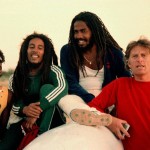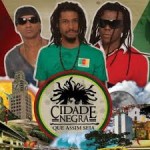Reggae music was birthed in the trenches of Kingston, Jamaica, but today it has evolved into a universal language, a world music, loved and respected across the globe. The music has become such a powerful tool that it has transcended geographical boundaries and has crossed language barriers to connect people worldwide. It has become so popular that there are many artistes outside of Jamaica who are now making reggae music, including artists from the Portuguese-speaking country of Brazil.
With the 2016 Olympic Games set for Rio, Brazil, in exactly 100 days, The Gleaner sought to catch up on the country’s entertainment scene, focusing specifically on the influence reggae music has had on that nation. Any simple research conducted into the culture of Brazil, particularly music, will show traces and influences of reggae. Bob Marley, Dennis Brown, Gregory Isaacs, Bunny Wailer and Jimmy Cliff are all popular reggae artistes that are loved and respected by people in Brazil. In fact, the latter lived in the country for a while and even has an album titled

Jimmy Cliff in Brazil.
Reggae’s influence in Brazil is also evident in the country’s very own samba music.
Terrianna Selby Kendall, commercial officer at the Commercial Sector of the Brazilian Embassy, explained to The Gleaner that for several years, Brazilians have been adding their own style to traditional reggae beats to create something with a more authentic Brazilian flavor. Those attempts have created what is known as samba-reggae in Brazil.
Reggae music has influenced some segments of Brazilian culture. The influence seems to stem from an appreciation for the music itself and the perceived ‘liberties’ that reggae artists and Jamaicans have, she said. This has pushed Afro-Brazilians and others to produce music with traditional as well as alternative reggae beats. For several years Brazilians have been including particular sounds, such as the ‘cavaquinho’ (an instrument used mostly in the music of the northeast of the country) to make the sound more ‘Brazilian’. The above mixtures have led to offshoots of reggae music such as reggae fusion and samba reggae.

Kendall then explained that Jamaicans travelling to Brazil this summer should not have a problem feeling at home in Rio, as the entertainment scene in that area is just as vibrant as the scene in Jamaica. Rio de Janeiro possesses a diverse and vibrant music scene. There is everything from Rap to Reggae, Forro to Rock, and many other genres such as Funk, Samba and Pagode in between, she said, listing some of the most popular reggae groups from the country.
Popular Groups
Some of the most well-known reggae groups and artists in Brazil include Cidade Negra, Natirus, Edson Gomes, Ponto de Equilibrio, Filosofia Reggae, Chimarruts, Mato Seco, Planta & Raiz, Tribo de Jah, Nacao Regueira, Adao Negro, O Rappa, Daniel Profeta, among others. She encouraged Jamaicans who will be making the trip to Brazil in the summer to go and catch a few of the above-mentioned acts in action, as she is sure they will be performing in and around Rio come June.

While explaining that Brazilians are knowledgeable of many Jamaican reggae artistes, Kendall pointed out that the most popular entertainer is still the legendary Bob Marley. He is the greatest reggae artiste known to Brazilians. Along with Usain Bolt, Bob Marley is the first name you’ll hear once you say the word ‘Jamaica’. There is an overall recognition that Bob Marley is one of “Jamaica’s greatest ambassadors”.
Kendall also went on to explain that dancehall music, another music form birthed in Jamaica, is also gaining recognition in Brazil.

Another important element of Brazilian music is ‘funk’. Funk would be the equivalent of ‘dancehall’, Kendall said. It can be raw and unadulterated with heavy elements of beats, lyrics and dance included in it. She encouraged Jamaicans to indulge in the best that Rio has to offer in terms of entertainment, as there are many clubs and pubs around the city that play reggae and dancehall music as well as their Brazilian alternatives.

Apart from ‘funk’ and samba, other music styles such as pagode and forro should offer some level of familiarity to Jamaicans and other Caribbean people. These can be found at pubs and bars in and around the city and on the beach. These pubs and bars can be found mainly in tourist areas such as Lpanema and Copacabana, and traditional areas in Rio de Janeiro, like Tijuca, Botafogo and Lapa. She also explained that some of the clubs occasionally feature a ‘reggae night’ or reggae-themed parties.


You must log in to post a comment.